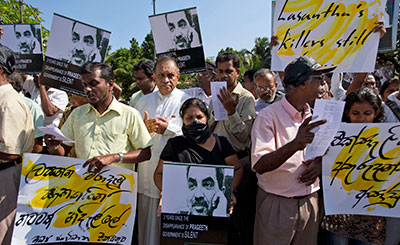Black January commemorations in Colombo have become an annual event. Tuesday’s demonstration was the second. The protest aims to recall the series of killings and attacks on journalists in Sri Lanka in recent years, many of them occurring in Januaries past. All of them have gone untried and unpunished, sustaining the country’s perfect record of impunity for those who want to silence media by murder.
The demonstrations are not huge, but still an annoyance for the government. Last year’s gathering had to be moved at the last minute when the government got a court order limiting the protest to a small area in front of the Colombo Fort Railway Station. The space was soon filled up with bussed-in counter-demonstrators, who accused the protesters of supporting the separationist Liberation Tigers of Tamil Eelam.
Prominent in the group this year, as she was in 2012, was Sandhya Eknelygoda. As we posted on the CPJ blog last week with “In Sri Lanka, justice for Eknelygoda is a waiting game,” January 24 was the third anniversary of the disappearance of her husband Prageeth, an opposition columnist and cartoonist. Sandhya has doggedly pushed to have her right to know what has happened to the father of her two sons. With her persistent, unassuming integrity, she is becoming an iconic figure, speaking out against the injustice and violence directed not just at journalists but all those whom the powerful want to mute.
Tuesday’s demonstration raised the memories of journalists who died in targeted killings–the most recent, Lasantha Wickramatunga, was beaten to death in January 2009. For what it’s worth, no other journalists have been singled out for murder since, according to CPJ research. It’s a dubious distinction to make, because physical attacks, arson, intimidation, threats, and disappearances–like Eknelygoda’s–have not ended. The public outcry, local and international, that followed Wickramatunga’s death apparently made it too politically costly to resort to murder to quiet journalists.
In March, Sri Lanka will come under scrutiny at the United Nations Human Rights Council session in Geneva. It will also host the Commonwealth Heads of Government Meeting later this year; here is the official government video welcoming visitors for the event. Human rights issues will come to the fore, “and the highly charged lead up to both events will be fertile ground for hate, hurt, and harm,” as one journalist messaged from Colombo a few days ago.
Public commemorations like Tuesday’s in Colombo are best when they celebrate the end of “hate, hurt and harm,” but this year’s Black January demonstration looks only to replicate last year’s, in that it is another way point for violence in Sri Lanka. And a Black January 2014 seems almost inevitable.
